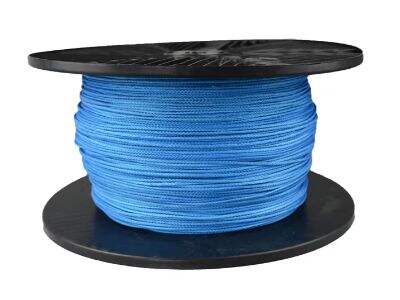Why not consider Which Mooring Rope is Right for Your Boat? Selecting the appropriate rope is very essential, and Jinli would explain you what type of mooring ropes can be considered like synthetic fibers or natural fibres.
Synthetic and natural fiber mooring ropes are used Comparing the two can be confusing. They are strong and durable, as well as weather tight so that is one reason why synthetic fibers have become such a popular choice. Polyamide, polyester and polypropylene materials are used as raw material for making these ropes. These are the materials that synthetic ropes from including strength and durability. On the other side, natural fibers from plants. These are sisal, Manila hemp and ropes of cotton. The core reason for this tendency is naturally fibers since these are derived from sustainable resources; hence, they always eco friendly.

Synthetic vs natural fiber mooring ropes? Synthetic: As such, synthetic ropes like Fishing Rope And Net are not absorbent and thereby retain their strength even after they have been immersed in fluid. This retains its tensile strength when wet unlike other conventional textiles it will never soak up water[]. If your boat stays in the water quite a bit, this is good advantage. The sunlight does not affect them (UV-resistant), keeping the color and properties of the rope intact, while when wet or damp they do not rot away nor produce mold as to biological ropes.
Conversely, natural fiber ropes are manufactured from raw materials that decompose which can be discarded in the wild without contaminating nature. Therefore they are a preferred choice for those who love mother nature. Synthetic ropes are generally costlier than natural ones, so if you're trying to be somewhat budget-conscious that could be a big plus for boaters. They are also grippy and easy to hold. This helps in places where they should be tied and hence remain fast or, simply put: Only when you want them to tether tightly with a high degree of stability.
You also need to consider the pros and cons of synthetic vs natural fibers in mooring lines- so be cautious while selecting what suits your boat best. However, if you need something that and has a good grip so is easier to work with then natural fiber ropes are probably the way forwards for you. If you want to ensure tough marine conditions, however, a synthetic rope like Safety Rope And Net might be due for it.
Before purchasing, it is also paramount to give a good look on the benefits offered by synthetic and natural fibers for mooring ropes. Because synthetic fibers are generally stronger than natural ones, they're especially good for high use boats. Once again, synthetic ropes require less upkeep because they avoid the common problems with natural rope rotting and growing mold. Also, they are very durable and able to withstand wear and tear so you can be sure if it has rubbed against the dock or another boat that no damages are done.
On the other hand, in a less hostile environment where wear and tear are not as significant natural fiber ropes and winch rope synthetic will work indeed better. They are affordable and good for light-duty boats without great need of extensive rope. They would be the best choice for those who care about their health and our universe as they are environmentally friendly environment-friendly because its material composition is natural, which can easily degrade if we dispose of it correctly.
So, yes you should consider in the benefits that synthetic and natural fibers have for mooring ropes before buying any. Customized Synthetic and Natural Fiber Ropes by Jinli Our synthetic ropes are composed of heavy-duty materials such as polyamide, polyester and polypropylene you can trust then to do the job right. As well as that you have selection of natural fibre rope in stock at Rea which means we carry both artificial hemp manila sisal cotton.

